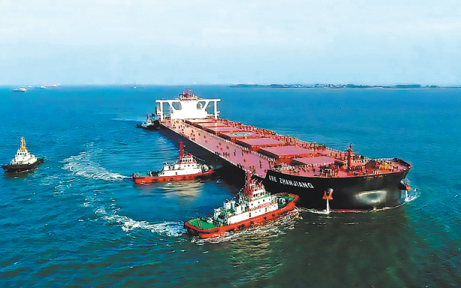Investments worth billions help create provincial subcenter
Zhanjiang has been growing smoothly into a regional subcenter of Guangdong province and is building a modern coastal economic belt through its gigantic industrial projects.
The port city, located in the less-developed western area of Guangdong, is home to several large investments, including the Zhongke (Guangdong) Refinery and Petrochemical project, Baosteel project and BASF's smart petrochemical project.
June 16 marks the first anniversary of Zhongke's operation. With an investment of more than 44 billion yuan ($6.81 billion) in its first phase, the project is the biggest of its kind put into operation during the 13th Five-Year Plan (2016-20) by China Petrochemical Corp. Also known as Sinopec, the company is one of Asia's biggest oil refiners.
The Zhongke project is designed to refine 10 million metric tons of crude oil and produce 800,000 tons of high-end ethylene products annually.
The project is expected to realize an annual industrial output value of more than 60 billion yuan. Out of this, it is expected to generate profits and taxes at a combined value of more than 26 billion yuan a year.
Also, downstream industries worth some 200 billion yuan will benefit from the project, according to the city government.
Between January and May, the Zhongke project refined nearly 6 million tons of crude oil and produced 340,000 tons of ethylene products.
Another mammoth project is being built by Baosteel, one of China's largest steel manufacturers. The project, which became operational in 2015, is tasked with eliminating outdated capacity and is aiming to become one of the world's most efficient green production bases for carbon steel.

The Ore Zhanjiang carrier is guided to dock at Zhanjiang Port in June. CHEN YIZHONG/FOR CHINA DAILY
So far, its No 1 and No 2 blast furnaces have reached target output. Construction of the No 3 blast furnace started in March 2019 and is scheduled to be finished this month.
Between 2017-20, it generated total profits of more than 10 billion yuan. Its industrial output value exceeded 149 billion yuan, accounting for 21 percent of the city's total.
The $10 billion BASF project began construction in November 2019.
The first batch of plants, which are expected to be operational in 2022, will produce engineering plastics and thermoplastic polyurethane to serve the increasing needs of various industries in southern China and throughout Asia. The whole project is planned to be complete by 2030.
Following suit, Air Liquide, a world leader in gases, technologies and services for industry and health, decided to invest in the city in 2020. Dow, a materials science leader, signed a memorandum of understanding to launch a South China specialties hub in the city in March.
Guan Yu, chief economist with the Zhanjiang bureau of industry and information technology, said the projects have many great advantages both in China and throughout the world. "With their help, Zhanjiang is speeding up the construction of a subcenter in Guangdong and a major growth pole of a modern coastal economic belt in the province."
These projects will play a key role in expanding the city's five advanced manufacturing clusters-green steel, green petrochemicals, high-end papermaking, green energy and new energy vehicles-and in promoting the city's high-quality development in the years to come, local officials said.
The improved business environment has helped Zhanjiang draw more attention from Fortune Global 500 companies. The city now has projects invested in by more than 10 such companies.
During the 14th Five-Year Plan (2021-25), the city government said it hopes to introduce new projects with a total investment of 300 billion yuan. Of this sum, more than 40 percent will be used in industrial projects.
To realize this goal, Zhanjiang plans to strengthen its port-based industries and build a large industrial park covering an area of 500 square kilometers.
The park will focus on developing new energy vehicles, auto parts, new materials, intelligent automobile equipment, equipment manufacturing, petrochemicals and steel, said Cao Xing, executive vice-mayor of Zhanjiang. The city is currently home to 20 industrial parks.



 Print
Print Mail
Mail

